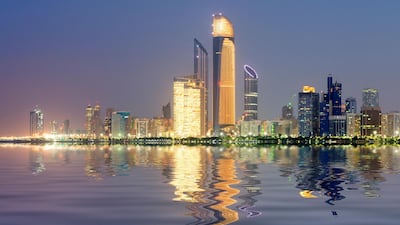The UAE’s economy is expected to strengthen this year, boosted by higher levels of government spending and increased oil production, propelling the country to outperform the wider region in terms of economic growth in 2019, according to a new report.
Headline economic growth in the UAE will rise to 2.2 per cent from an estimated 1.7 per cent in 2018 – driven by 2.5 per cent growth in real oil gross domestic product, and 2.1 per cent non-oil GDP growth, according to the latest joint outlook from research firms Oxford Economics and the ICAEW.
"We see an acceleration in the non-oil sector this year due to increased government stimuli, spending on infrastructure and reforms to cut the cost of doing business, while at the same time, the oil economy has grown due to rising production," Mohamed Bardastani, senior Middle East economist at Oxford Economics told The National in an interview.
The UAE’s forecast oil GDP growth is the fastest for the sector in three years, reflecting ongoing investment by the country to increase production to mitigate for tightening global oil markets – particularly after the US imposed sanctions on Iranian oil exports.
However, that higher production could be weighed down by lower oil prices, which are forecast to stay flat for the year at around $60 per barrel, the report added. However, Brent oil hit a 2019 high above $72 a barrel on Wednesday, defying expectations and demonstrating firm demand, while global supply remained tight.
Meanwhile, last year, Abu Dhabi’s government announced a Dh50 billion economic stimulus to be rolled out from this year to boost non-oil GDP growth, and the UAE has implemented reforms to make it easier to do business in the country, including lowering business registration fees. The UAE’s foreign direct investment rose 41 per cent year-on-year in 2018, and preparation for Expo 2020 Dubai, which commences next October, is expected to provide a further boost to the non-oil economy, noted Mr Bardastani.
The UAE’s real estate market remains weak and job creation is modest, he said, with notable declines in employment in the services sector during the past year. Job creation in this sector declined by 0.5 per cent year-on-year in the fourth quarter of 2018, according to the UAE Central Bank.
“We also think the real estate sector – which has seen ongoing price declines in the past few years – is unlikely to recover this year due to high levels of incoming supply and relatively sluggish demand,” Mr Bardastani added.
Still, the UAE is expected to outperform the wider Middle East in terms of economic growth this year, the report said. Real GDP growth in the Middle East (including the GCC) is projected to slow to 1.3 per cent in 2019, from 1.6 per cent last year.
The GCC is expected to see GDP growth of 2.3 per cent – “marginal” improvement on 2 per cent in 2018. “Despite a strong drive by the authorities in recent years to diversify their economies, oil continues to play a dominant role, constituting up to 46 per cent of total GDP,” the report said.
“As such, the renewal of the Opec-plus oil production cuts on December 6, which came after a dramatic drop in oil prices from $86 per barrel in late October 2018 to $70 per barrel more recently, will limit the oil sector’s contribution to overall growth.”
Saudi Arabia’s economy is projected to grow at a stable 2 per cent. In 2019, record budget spending and various pro-growth government initiatives will ensure faster expansion of non-oil activity, which is expected to be the primary engine of growth in 2019 as the oil sector slows. The non-oil sector is forecast to grow by 3.1 per cent.
Oman's 3.3 per cent GDP growth in 2018 is expected to moderate to around 2.9 per cent this year due to muted 1.2 per cent projected growth in the oil sector compared to 4.5 per cent last year, Mr Bardastani told The National.
2019 is also set to be a challenging year for Bahrain, which has fewer oil resources than its GCC neighbours. In January, it introduced a 5 per cent VAT.

